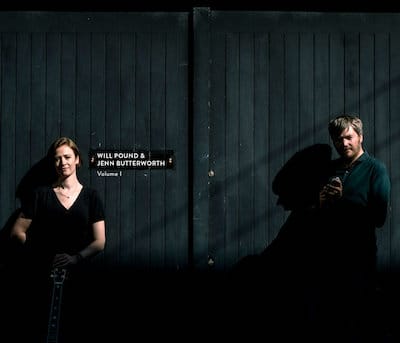Will Pound and Jenn Butterworth
Volume 1
LuluBug Records
24 February 2023

I first heard Will Pound talk enthusiastically about working with Jenn Butterworth during an interview at Cropredy 2019. That was in connection with A Day Will Come, Will’s project and eventual album, exploring the folk music of all 27 EU countries. Jenn, that year’s winner of the Scots Trad Music Awards Musician of the Year, was central to the project, contributing to the album and the subsequent short tour. But that wasn’t the limit of their joint ambition; they began playing duo gigs once Covid restrictions eased and have now released this album, Volume 1. There are nine tracks, eight of which are tune sets featuring Will on either harmonica or melodeon and Jenn on guitar. The ninth is a song on which Jenn provides the vocal.
After seeing Will perform, leading The Will Pound Band, back in 2014, our paths have crossed frequently at festivals and gigs. Each time I’ve come away astounded at the vigour and enthusiasm he puts into his performances and equally into researching the tunes and preparing the arrangements. It seems that in Jenn Butterworth, he’s found a kindred musical spirit, and the result is a joy. This is apparent right from the start of Volume 1 when the first notes from the harmonica come in over an already briskly strummed guitar rhythm.
The first of the three tunes in the opening set, Reckoned, is one of Will’s compositions inspired, he says, by the fiddle playing of Liz Carroll and Martin Hayes. The track title derives from this tune’s title, The Reckoning, and this is something of a convention on the album, devise a short, snappy track title from one of the tune titles. The brisk start is no barrier to the pace increasing as the tune develops, and it’s rapidly apparent that Jenn’s contributions on guitar are going to be far more than a simple rhythm lying behind Will’s harmonica. As you’d expect, there’s a backbone of percussive strumming, but she injects passages where she lets the notes ring out, all the while tweaking the rhythms. So, while the harmonica is nearly always at the front of the mix, in terms of complexity and variation, the guitar and harmonica operate with equal freedom. The result is a musical conversation between them. By no means an argument but a conversation where each is so keen to get their point across that both talk at once, and pauses are a luxury neither can afford. Musically, this makes for a breathtakingly enjoyable ride that continues into the second tune, The Barrowburn Reel, a composition from Scottish dance band leader and fiddler, the late Addie Harper Snr. and then on to the closer, The Clinch Mountain Backstep, written by Bluegrass banjo maestro Ralph Stanley. A good part of the fascination here comes from passages originally written for fiddle and banjo being so effectively rendered on a harmonica, leading to an upwelling of respect that’s certain to recur throughout the remaining forty or so minutes of music.
The next set, Blackthorn, has Will continuing on harmonica and pairs two traditional jigs, The Blackthorn Stick and The Irish Washerwoman, both taken at a somewhat more leisurely pace than Reckoned. Will’s long-standing association with traditional dance no doubt influenced the tune selection as both are commonly used for the Rapper dances of North East England. The dance connection continues with the Bourrées, a pair of Will’s lockdown compositions that sees him switching to melodeon. He’s back on harmonica for the following track, supporting Jenn’s voice on There’s Better Things. An interesting song choice, written in 1958 by Peggy Seeger at the time of CND’s Aldermaston marches. Jenn’s voice is perfect for it, giving just the right level of lightness and jollity for maximum impact when contrasted with lyrics warning of the existential dangers to humanity posed by nuclear weapons.
The Workout Suite sees Will doing some rather clever things with his melodeon, three tunes, each in a different key and each key is one rarely, if ever, played on a D/G melodeon. The suite grew out of a challenge that Will set himself, to work out all the major scales possible on a D/G accordion and, having succeeded, he thought he’d better make use of some and so wrote these pieces. Unsurprisingly, Jenn’s guitar accompaniment is rather more restrained here, leaving the focus squarely on the melodeon.
By this point, it might be appropriate to wonder what else the pair could introduce to add yet more variety to the album. And the answer is a classical piece, Handel’s baroque sinfonia, The Arrival of the Queen of Sheba, followed by a solemn march, The Battle of the Somme. Originally composed by William Lawrie for the Highland pipes, it’s well suited to Will’s melodeon. At the same time, Jenn adds some very subtle but by no means simple guitar, the march providing the album with a memorable, soulful interlude.
The final two tracks re-introduce the style that opened the album, Will back on the harmonica and letting rip, Jenn matching him on all fronts. The pairing of Soldier’s Joy and The Jolly Beggarman is the livelier of the two, whilst the Speed the Plough and The Hesleyside Reel pair starts at a sedate pace; ploughs tend not to move all that fast, but then the Reel more than makes up for it, ensuring the album closes with a flourish and a prodigious amount of swing.
Volume 1 is an album packed with outstanding musicianship while Will and Jenn show themselves to be brimming over with ideas and possessed of a determination not to be confined by others’ expectations of what constitutes their style. Having chosen Volume 1 as an album title, we can surely expect to hear more from them before long. Will has the last word; once he gets his breath back, he utters just the one, “blimey”.

